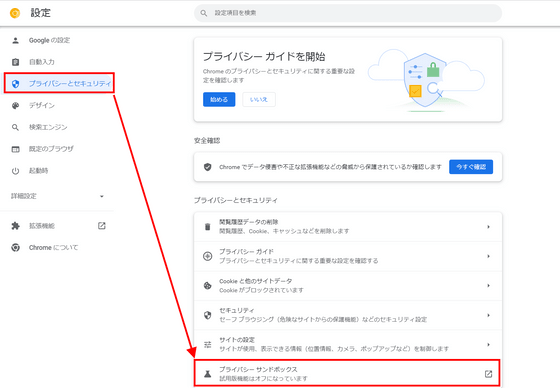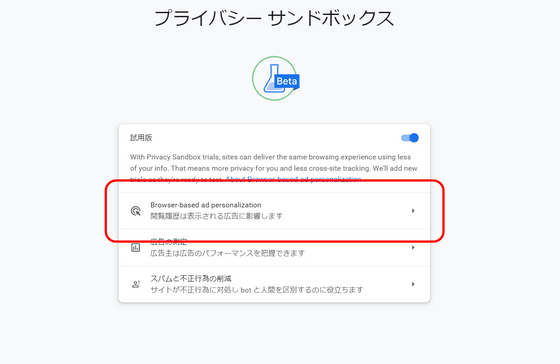Google introduces new tracking technology 'topics' to Chrome

It is reported that Google has begun testing 'topics' as an alternative to
Chromium Blog: What to Expect from Privacy Sandbox Testing
https://blog.chromium.org/2022/03/what-to-expect-from-ps-testing.html
Chrome's “Topics” advertising system is here, whether you want it or not |
https://arstechnica.com/gadgets/2022/03/googles-topics-advertising-system-starts-rolling-out-to-chrome-canary/
Google starts testing a new way to personalize ads based on interests
https://www.androidpolice.com/google-chrome-topics-test-interest-based-ads/
In 2019, Google announced a policy to abolish third-party cookies, which have many privacy issues, and developed FLoC, a tracking technology that can replace cookies. However, although FLoC does not track individuals, it is possible to group users, share their interests with othercompanies , and perform targeted advertisements based on that. severely criticized. GitHub and Amazon were embarking on the elimination of FLoC one after another.
In response to these headwinds, Google has launched a new 'topic' to replace FLoC. Read the article below to learn more about the detailed mechanism of 'topics' that store interests generated from the user's browsing history on the browser for up to 3 weeks and share them with advertisers.
What kind of mechanism is Google throwing away the new system FLoC that was described as 'worst' and changing the policy to 'topic API'? -GIGAZINE

Regarding this 'topic', Google said on March 31, 'From today, developers can start global testing such as' topic 'in the Canary version of Chrome.'Google Chrome announced the introduction of 'topics' to Chrome Canary, an experimental version of .
To see what the 'topic' does, select 'Privacy and Security' from the Chrome Canary settings screen and click 'Privacy Sandbox'.

Then, the item 'Browser-based ad personalization' appeared. This is the 'topic'.

Since it is still in the test stage, it is said that advertisements based on 'topic' will not be displayed at the time of article creation. If the browser collects user's interests by 'topic', lists such as 'Auto & vehicles', 'Books & literature', 'Comics & animation' as follows is generated, and it is also possible to delete and customize it with the 'Remove' button on the right. Users can also turn off the 'Topic' feature itself.

With this release, at the same time as the 'Topic' API, ' FLEDGE API', which is responsible for executing ad actions and selecting advertisers, and ' Attribution Reporting API', which measures ad clicks and impressions and tracks conversions , etc. was also introduced to Chrome Canary.
Regarding 'topics', IT news site Ars Technica said, 'It's not much different from FLoC, but if you use the 'Topic API', it seems unlikely that someone will target users individually. I can't help but feel that it's unpleasant,' he commented. Android Police also said, 'While Google is only looking for technical feedback so far, the company will almost certainly get a word or two of new technology orders from privacy watchdogs.' .
Related Posts:
in Software, Posted by log1l_ks





